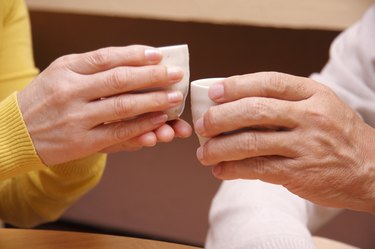
Genmaicha is a Japanese green tea mixed with brown rice kernels and noted for its pleasant roasted flavor. Genmaicha can be made with various kinds of green tea. Research suggests that drinking genmaicha regularly offers many health benefits and helps prevent disease, due to the beneficial polyphenols in the tea.
Antioxidants
Video of the Day
Genmaicha tea is rich in polyphenols, such as catechins and gallic acid, as well as other antioxidants like carotenoids and ascorbic acid. According to a 2006 review of the beneficial effects of green tea published in the "Journal of the American College of Nutrition," green tea has a higher total antioxidant capacity than black tea and higher antioxidant activity than vegetables such as garlic, kale, spinach and Brussels sprouts. Smokers who consumed 6 cups per day of green tea for seven days showed lower levels of free radical-induced DNA damage as well as less free radical generation.
Video of the Day
Cancer Prevention
In animal studies, green tea has been shown to inhibit cancer of the skin, lung, oral cavity, esophagus, stomach, liver, kidney and prostate. The "Journal of the American College of Nutrition" study reported that women who drink green tea regularly show a significantly reduced risk of breast cancer than women who drink less than 1 cup per month. Drinking green tea is also associated with lower risk of ovarian cancer and human prostate cancer. Research on the association between green tea and stomach, colon and rectal cancers is less conclusive.
Low Blood Pressure
In Chinese medicine, green tea such as genmaicha is believed to help lower high blood pressure; however, research on this use is inconclusive. A study published in 2004 in the "Archives of Internal Medicine" concluded that drinking green tea daily for one year significantly reduced the risk of developing hypertension. However, other studies have shown no effect.
Heart Health
Epidemiological studies suggest that drinking green tea lowers your risk of developing cardiovascular disease. A study in the "American Journal of Epidemiology" found that people who had drunk 1 or more cups of green tea, such as genmaicha, per day in the previous year had a 44 percent lower risk of heart attack than those who drank no tea. A 2001 meta-analysis in the "American Journal of Epidemiology" on the effect of tea on cardiovascular disease estimated that an increase in green tea consumption of 3 cups per day decreased the incidence rate of heart attack by 11 percent.
Serving Tips
To prepare genmaicha, use 1 heaping teaspoonful of loose-leaf tea for each cup of water. Genmaicha, like other green teas, should be steeped at a lower temperature than black or oolong teas. The ideal water temperature is 176 to 185 degrees Fahrenheit. Steep your genmaicha for no longer than three minutes to avoid an overly bitter tea. If your resulting tea is too strong, use fewer leaves next time. If you'd like a stronger tea, brew your next cup with more leaves. Traditionally, genmaicha is enjoyed without added milk or sweeteners.